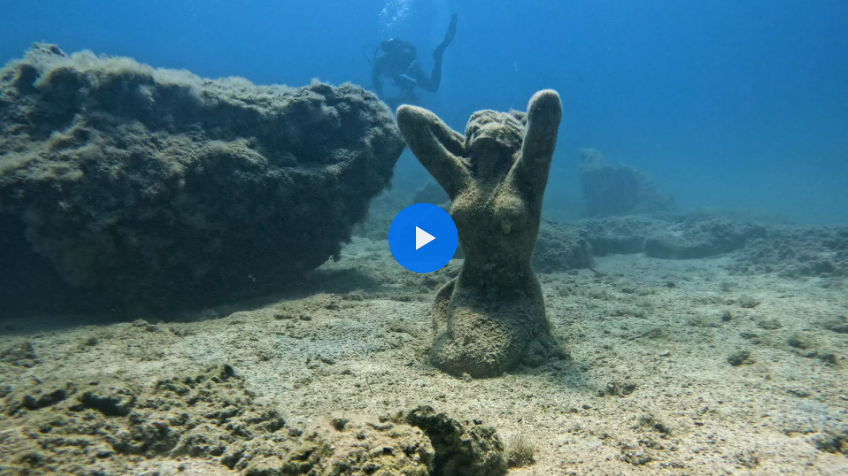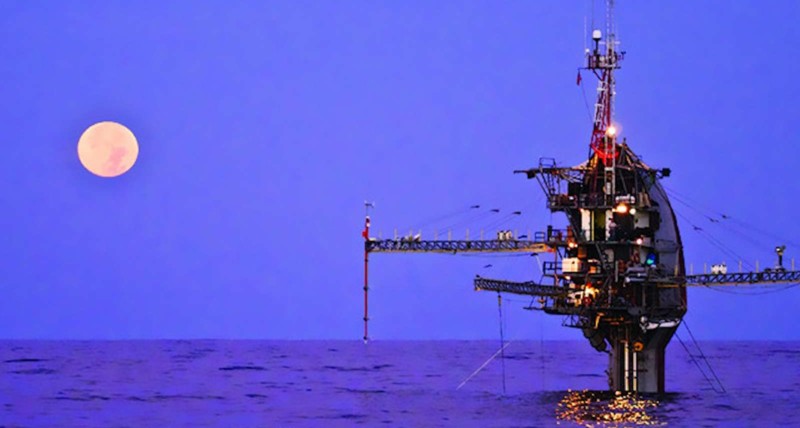Sea temperatures keep rising, with increasingly prolonged periods of warmth. While this pleasant weather attracts vacationers, its impact threatens underwater biodiversity.
In Cyprus, record temperatures are being recorded both on land and at sea. Heatwaves are having devastating effects on marine ecosystems, which are particularly vulnerable, as evidenced by research from the Cyprus Marine and Maritime Institute (CMMI), led by marine ecologist Louis Hadjioannou.
While warm waters can be pleasant for vacationing, they can be devastating for marine life. As ocean temperatures soar during increasingly extended periods, how can we appreciate the threat to marine ecosystems, and is there anything we can do to prevent the worst?
« Visibility is not very good today, » points out Louis Hadjioannou, a marine ecologist at CMMI, during a dive. « Normally, it’s as clear as crystal. »
The area being explored is clearly facing serious difficulties.
Last year, it was a lush seagrass meadow, a haven for sea turtles and stingrays. Today, it is a bleak expanse strewn with remains of sponges that once thrived.
« We are located in a sensitive area regarding temperature increases, both in the water and outside, » continues Louis Hadjioannou. « And these rising temperatures, which become more intense for longer periods, are obviously affecting organisms, sometimes to the point of death. They are disappearing. »
As local species struggle with rising temperatures, exotic species from the nearby Red Sea are migrating to these waters, further disrupting the ecosystem.
« With rising temperatures, many new species manage to cross the Suez Canal in one way or another, » says the researcher. « They find favorable conditions for their development. In many cases, these new species displace local species, causing a multitude of problems. »
For over a decade, Cypriot researchers have been closely monitoring rising marine temperatures using specific underwater sensors.
« We’re approaching the location where we deployed our data recorder, » explains Louis Hadjioannou during his dive.
According to the collected data, Cyprus’s waters are warming year-round, particularly in shallow areas where life depends on vulnerable coral reefs. The research team takes photos of the coral to document changes over time.
« Here, you can see polyps that have degraded. They look completely dead. It is indeed dead, » notes the researcher.
The CMMI team is participating in two EU-funded research projects – PUREEF-Y and EFFECTIVE – which study the impact of marine heatwaves on shallow reefs and aim to find natural solutions to protect and restore marine ecosystems before they disappear for good.
« We will try to collect sediment samples, » says Louis Hadjioannou.
« By taking sediment or reef core samples, we can understand how the climate was in the past from the bottom of the sample, then trace it up to the core to understand how it has evolved over the years up to today. »
Sediment analysis indicates how marine heatwaves affect pollution levels and other variables.
« In the sediments, we also study meiofauna, » says Eleni Christoforou, a biologist at CMMI. « It consists of small organisms whose biodiversity depends on temperature, nutrients, and other factors. Many species could even disappear because the water or sediments are too warm, or because nutrients have changed due to climate disruption and heatwaves. »
The crisis in Cypriot waters is just one example of a global phenomenon, which is closely monitored by oceanographers at Mercator Ocean International in Toulouse, France.
Karina von Schuckmann, one of the main authors of the Intergovernmental Panel on Climate Change (IPCC) reports, explains that the intensification of heatwaves is one consequence of the imbalance of temperatures on our planet.
« Marine heatwaves can occur because there are heatwaves in the atmosphere, » explains Karina von Schuckmann, oceanographer. « There is an interaction between the atmosphere and the ocean, and the ocean warms up, the wind slows down. The latest IPCC report revealed that extremes are generally increasing, intensities are higher, and frequency is rising. »
Marine heatwaves – prolonged periods of unusually high sea temperatures – are spreading rapidly across the world’s oceans. They threaten ecosystems, fishing, aquaculture, and tourism, and can last for weeks, months, or even years. In the Mediterranean, surface water temperatures have been rising since the 1980s, a trend expected to continue throughout the 21st century.
To better understand and predict marine heatwaves, Mercator Ocean International has developed advanced models using the Copernicus Marine Service, part of the EU’s Copernicus program.
« We collect all available observations, satellites, and what we call in situ data, meaning data collected at sea with autonomous buoys, as well as ships with various measuring instruments, » says Marie Drevillon, oceanographer at Mercator Ocean International. « From all these observations, we integrate them into a modeling solution. We make forecasts for the next ten days, allowing us to know if a marine heatwave will persist in the same location or if it will evolve. We publish weekly bulletins to provide the current state. »
« We need to understand which biodiversity will be permanently destroyed, » says Pierre Bahurel, director general of Mercator Ocean International. « What will be the impact on us, what will change in the grand balances, and, most importantly, how can we avoid continuing the disaster we have inflicted on the oceans. »
According to scientists, 90% of coral reefs worldwide could disappear by 2050.
To strengthen reef resilience, Louis Hadjioannou’s team in Cyprus is experimenting with coral nurseries. They place fragments of threatened species in a safe area, away from predators. The goal is to allow these fragments to grow in the protected nursery, then transplant them onto the seabed, contributing to the regeneration of healthy reef ecosystems.
Louis Hadjioannou takes us to a platform located 5 meters deep.
« Here we are at the floating nursery, » says Louis Hadjioannou. « This is the first time we are testing this type of floating nursery in the Mediterranean, across all species. We will install the corals and monitor them for at least a year using photogrammetry and other visual methods. »
« This is the peak period for heatwaves, » observes the researcher. « We will continue to deploy and install more coral fragments on the floating nursery across different seasons to see how they perform. »
« We are now certain that the sea will be different in ten or twenty years. We are striving to save some of the key species that support the rest of the biodiversity, hoping that future changes will not be so detrimental, or even fatal, to marine life. »
As the ocean continues to warm, time is running out for many species facing a future they may not survive.
Source: euronews



